Peter MALONE
Saturday, 18 September 2021 19:42
Something of Value
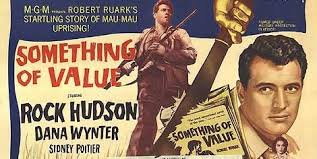
SOMETHING OF VALUE
US, 1957, 113 minutes, Black and white.
Rock Hudson, Dana Wynter, Sidney Poitier, Wendy Hiller, Juano Hernandez, Robert Beatty.
Directed by Richard Brooks.
Something of Value is a 1950s film about Kenyan independence. It was based on a very popular novel of the period by Robert Ruark.
Kenya had experienced the uprising of the Mau Mau, especially in the mid-1950s (as seen in such a British film as Simba). In this film, there is a focus on a long-time friendship between a white boy and a black boy. They grow up as Rock Hudson and Sidney Poitier. With the massacres of the whites and the imprisonment of the Kenyan leaders, the black man joins a rebel group, not approving of the slaughter.
Rock Hudson portrays a character who is suffering because of the persecution of his family but who believes that with reason and dialogue, peace can be achieved. This is his aim in his dialogue with the Sidney Poitier character.
This is an idealistic and optimistic film – especially in the context of the realities of the 1950s.
There is a strong supporting cast led by Wendy Hiller and Michael Pate.
The film was co-written and directed by Richard Brooks, a former writer (Crossfire) who began making films in the early 1950s (The Last Time I Saw Paris, Blackboard Jungle). He was to make a number of adaptations of plays and novels during the 50s and 60s including The Brothers Karamazov, Cat on a Hot Tin Roof, Lord Jim, In Cold Blood.
1. The meaning of the title as explained at the beginning? Its connection with Churchill's words, at the end of the film? The significance of the title for the story portrayed and Its themes?
2. How relevant is this film now in changed colonial situations? Is this a similar situation to problems now in the developing world? Does the film portray what was the attitude of the world then, of one man observing the changes?
3. How successful was the screenplay? Its presentation of good and bad characters? The situations? Did they seem too contrived? How spontaneous was the dialogue or did it seem to be preaching and emphasising message?
4. How much impact did the fi1m have? Would audiences find it convincing about colonial situations and racist problems? Would it urge change on an audience? Would it veer towards unreal entertainment?
5. How well did the film portray the contrast between Peter and Kimani? The happiness of the start, the initial clashes because of racistm,laws, the portrayal of two breeds of men, black and white? Peter’s fear of offending Kimani, rebellion? The role of KimaniJ in the raids and Peter's response? Peter's pursuit of Kimani? The unnecessary nature of Kimani’s death after the possible reconciliation? The two children black and white being brought up together at the end - would there be harmony or a repetition of the past? Were the main characters well drawn and portrayed, or was there am emphasis on them representing attitudes?
6. Holly as an attractive heroine? As a conventional white wife supporting her husband and suffering in Africa? Did she give any insight into the plight of the situation? A comparison of her with Elizabeth Newton? Elizabeth and her relationship to Jeff? An a victim of' the raid, as wanting to bear a child for a new Africa?
7. The portrayal of Mr McKenzie? as good and as wise, concerned? with the native Africans? A conventional good man or did he give insight into ‘necessary’ attitudes? The contrast between him and Jeff Newton. and his racist attitudes and disregard of human rights?
8. How interesting was the portrayal of Africa and people's love for Africa? Its plight, racism, history? The importance of the sequences of dinners with the whites discussing their attitudes? The contrast of the white style with the black style of life? The impetuous nature of Matson and his rabble-rousing? The fact that he, because of suspicions, caused disharmony at the end?
9. The portrayal of black Africa? How sympathetic, how real? As seen through Kimani, as a reluctant rebel? The portrayal of life of the villages, Africans as human beings equal to the whites?
10. Did the film show credibly how the Mau Mau societies arose? The sesne of injustice and rage? The importance of the sequences of iniation and audience response to these? The loyalty that the Mau Mau gained over people? The fact that all Africans did not agree? Audience response to the violence of the raids? The portrayal of police investigations? Internment and the rough attitudes of the whites even Peter? The starvation situation and the need for a truce? The possibilities in the truce between Peter and Kimani and the future of Africa? The breaking of the truce and suspicion because of the impetuous hostility of men like Matson?
11. The melodramatics or genuine drama of the final confrontation? The death of Kimani and its necessity? The pathos because of his attitudes and sense of betrayal and persecution?
12. How well does the film show the pattern of racism in the past? Is this a pattern still for the world and its race problems?
Published in Movie Reviews
Published in
Movie Reviews
Tagged under
Saturday, 18 September 2021 19:42
Statement, The
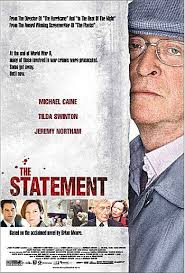
THE STATEMENT
UK/Canada, 2003, 120 minutes, Colour.
Michael Caine, Tilda Swinton, Jeremy Northam, Matt Craven, Alan Bates, John Neville, David de Keyser, Colin Salmon, Malcolm Crawford, Charlotte Rampling.
Directed by Norman Jewison.
The Statement is based on a 1990s novel by Irish born Catholic author who became a Canadian citizen and an agnostic. His novels are compared with those of Graham Greene and are filled with Catholic issues.
This novel is based on actual stories of collaborators with the Nazis in the Vichy regime who executed Jews or sent thousands of them to the concentration camps. After the war, some of these men found their place in the French government, many were sheltered by the Catholic Church, especially in monasteries and by elitist groups who, especially after the Second Vatican Council, disapproved of changes and moved to extreme traditionalist positions or followed Archbishop Marcel Lefebvre into schism.
The film opens with a sequence where a young Pierre Broussard is instrumental in the killing of seven Jews. Filmed in black and white (and recurring in the memories and dreams of the older Broussard), the young actor is dubbed by Michael Caine who portrays Broussard in the 1990s, hiding his identity, finding support in several religious houses, especially by abbots and clergy who were members of a group called the Chevaliers de Marie. The basic outline of the plot (screenplay by Ronald Harwood many of whose films focus on Nazi issues like Taking Sides and his Oscar-winning, The Pianist) is a detective thriller as a Paris judge and an army officer are assigned to find Broussard and he continually moves hiding place. Tilda Swinton is strong as the wilful judge (Catholic mother, Jewish father, now agnostic) as is Jeremy Northam as the soldier. While Broussard had received a pardon from the president, he is now sought by the authorities according to the recent law on crimes against humanity.
Michael Caine is an interesting and effective choice for Broussard, sometimes genial, sometimes cold-blooded, sometimes cringing in his dependence on confession and devotions and his image of himself as a loyal Catholic. From this vantage point, it is alarming to look at the role of many churchmen, especially from contemplative religious orders who took the side of the Nazis to combat Communism during the war and ignored the fate of the Jews.
There is a memorable supporting cast which includes Alan Bates as a French official, John Neville as the evil behind the scenes with his ruthless assistant Ciaran Hinds, Charlotte Rampling as Broussard's wife and Malcolm Sinclair as the Cardinal of Lyons who is trying to be more open about what has taken place in his diocese and in Provence.
Fine performances, interesting issues and an examination of conscience by the Church for the sins of commission and omission by some of its leaders.
1. The novel by Brian Moore, the facts about Nazi collaborators in France and the Vichy government, legislation, crimes against humanity, crimes against Jewish people? Memories of the Nazis and collaboration?
2. The critique of post-war France, former collaborators in government, being protected by the law, by the Catholic church?
3. The 1944 prologue, black and white, the village, the menace of the trucks at dawn, the raid, the taking of the Jews, taking of hostages, their being executed? Broussard and his commanding officer, the photo? The shooting, Broussard finishing the victims off? The device of using Michael Caine's voice for the actor portraying his younger self? These sequences later in flashbacks, memories and dreams, Broussard's conscience?
4. The title, the typing of the document, the official statement, the killers having it to put on Broussard's body, people assuming that it was Jewish retaliation? The irony that it was being used by the French for their own protection and secrecy?
5. Michael Caine as Broussard, his history, in the war as a young man, post-war, his marriage, his charm, seemingly ordinary, the photos, going for a beer at the café, collecting his mail? His being pursued by the assassin, the irony of his being alert and shooting the assassin? Taking his documents, pushing the car over the cliff? Thinking that the assassin was Jewish? His going to the monastery, on the move, his continued sense of guilt?
6. The Catholic themes, Broussard and his right-wing Catholicism, his wife's comments about his love for the priest facing the altar and mumbling in Latin, his elitism, not wanting to kneel next to Africans in church? His belonging to the Chevalier of St Mary? His going to the commissar, his deference towards him? His travelling to go to confession? The Cardinal of Lyon and the lack of protection for criminals like Broussard, yet his being sheltered in many monasteries, being sent money every month? His final visit to the abbey in Nice, the young priest helping him to escape across the roofs? His religion, devotion, patronage of St Christopher, prayers, kneeling on the floor and asking for forgiveness, wanting to be in the state of grace? His being comfortable with the monks and the priests and with the Chevaliers?
7. His interactions with people, secrecy, preservation of normality? His visit to his wife, letting himself in, the dog - and his threats? His wife's telling him the truth about himself? Yet her love for him?
8. Judge Livi, tough, the third judge to get the job to track Broussard down, her being summoned by her uncle Armand and his talk about the poisoned chalice - and her returning it to him at the end? Her background, her Jewish father, Catholic mother, stating that she was an agnostic? With Roux, the interview, his being her subordinate, taking him to dinner and his pain? Their work together, examining the documents? Her going to visit the Jesuit, the friendship from university days, his curating the library, the discussions, his hesitance, his giving her the information outside the building? Roux and his going to the home for elderly priests, playing bowls, the senile priest talking about going to confession and being on the run? Their visiting the Cardinal of Lyon, his assistant, his opening up documents, yet his treading carefully? The discussions with the professor who assembled the documents? Their working together, in the police cell, secrecy? The judge's decision to publish the photo, Roux's advice against it? It forcing Broussard to go underground? The discussion with the police chief and his enjoying his dinner? The raid in Nice, their being too late? Going through the list of monasteries, finding Broussard dead? Going to the reception, the judge and her discussion with Armand, the discussions with the Old Man and his finally being exposed? Roux, his military background, personality, collaboration with the judge, the interviews? The two and their personalities, motivations?
9. The public officials, Armand and his warning, the judge and Roux being followed, their being photographed, Armand getting the photos?
10. The group of abbots and superiors, their sheltering of Broussard, giving information, obedience to the cardinal, giving the truth, concealing the truth, old loyalties, the phone calls to the Vatican and the Vatican connections of the past? The commissar and his working in the vineyard, his being arrested, wanting it to be known that he had collaborated with the police?
11. The Old Man, the sinister power behind the throne, his being the officer commanding at the incident with the death of the Jews? His communication with his official, his finally asking him to do the assassination after the two assassination attempts failed, the opening assassination, the young man and his super-confidence, being shot by Broussard in the toilet? Their plan to pretend that it was a Jewish conspiracy rather than self-protection? The police official, the phone calls, the promise of a passport, meeting at the café in Nice, his shooting Broussard in the street?
12. The portrait of Broussard, his last days, the background of his life, his self-pity, his dependence, his finally feeling that he could escape? His death?
13. The information given to the audience in the aftermath of the film about the legislation, about war trials?
Published in Movie Reviews
Published in
Movie Reviews
Tagged under
Saturday, 18 September 2021 19:42
Song of Russia
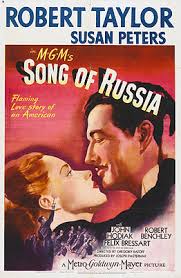
SONG OF RUSSIA
US, 1944, 107 minutes, Black and white.
Robert Taylor, Susan Peters, John Hodiak, Robert Benchley.
Directed by Gregory Ratoff.
Song of Russia was made by MGM in the middle of the 40s - a propaganda movie designed to help the American audience collaborate with the Russian war effort. After suspicion in the 20s and 30s about the Soviet Union, America found itself as as an ally of the Soviet Union against the Nazis. Of course, this was to break down after the end of the war and the coming of the cold war and the Iron Curtain. At this stage such films as Song of Russia as well as Lewis Milestone's The North Star were considered idiologically unsound.
The film is a star vehicle for Robert Taylor, one of MGM's most popular stars. It was directed by emigre Gregory Rattoff. The film is idealistic in its presentation of life in the Soviet Union - happy peasants, Moscow nightclubs and cafes, plenty of singing and dancing and happy villagers etc. However, the film relies for its emotional appeal on the popularity of music which is used extensively througout the whole film.
1. Entertaining war story? Propaganda in its time? Impact in later decades? The history of American and soviet relationships?
2. MGM production values, black and white photography, stars and cast, the use of music?
3. The title, evocative of the music, Russia and its traditions?
4. The structure of the film: John Melville, his experiences in the Soviet union, the conducting of the concert, the flashbacks, his crisis - especially with Nadya? The revealing of her as his pianist at the concert?
5. The film as morale booster, propaganda, idealising of the Soviet Union? Ignoring of repression?
6. Robert Taylor as John Melville, his reputation, conducting? The playing of the American national anthem? Visit to Moscow, concerts and rehearsals. The Russian authorities? The playing of Nadya? Attraction, discussions with her request to go to the town, seeing the sights of Moscow and the collage of Moscow, the cafe? His going to the town, becoming friendly with the people of the village? The meal, the engagement, the marriage? The Russian ceremony? The outbreak of the war, Nadya returning home, his concert work, playing for the troops and their morale, his journey to the village, the interview with the officer, his being allowed to the reunion? The death of the boy? The village and their decision that Nadya should go back with him to New York? That he might tell the story of Russia in the United States?
7. Nadya, the village background, her work in the village, family? Her talent as a pianist? Trying to see John at the airport, playing for him, the discussions, the outings, falling in love? Her return to the village? Cooking the meal for him, in the village, romance, the marriage? Going back because of the war, the bombardment of the town, the decision that she go to America?
8. The people of the village, the preparation for the music festival, love of music, song and dance? The wedding? Boris, Nadya's father, the experience of the war, the committees? Pleading with John to take Nadya back to America? The patriotic tone?
9. Hank, Robert Benchley's comic style, his experience in Russia, managing interaction with the Russian officials?
10. The theme of children, music, the boys and his ambitions to play, being straffed by the Nazi plane?
11. The picture of the war, the collage of war footage? The impact of the Soviet Union? The picturing of Stalin's radio speech and its sentiments?
12. A film of its time? The blend of entertainment and propaganda?
Published in Movie Reviews
Published in
Movie Reviews
Tagged under
Saturday, 18 September 2021 19:42
Sea of Love
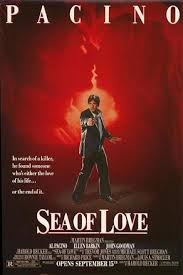
SEA OF LOVE
US, 1989, 113 minutes, Colour.
Al Pacino, John Goodman, Ellen Barkin, Michael Rooker, William Hickey.
Directed by Harold Becker.
Sea of Love is a murder mystery and a thriller focussing yet again on the burnt out New York cop. This time it is a moody At Pacino. And he gets entangled with one of his suspects, Ellen Barkin. Did she? What will happen to him? It is a dark film of moods, suspicions, desperate passion - relieved by some comic touches from John Goodman as a fellow investigator. The plot is complex, the acting carries it through. A gloomy anti thriller from Harold Becker, director of a number of Joseph Wambaugh films like The Onion Field, The Black Marble as well as Taps, The Boost. (For television release, the character of Pacino's wife, played by Lorraine Bracco, was reintroduced after being cut for cinema release.)
1. Interesting police thriller? New York murder mystery? Portrait of relationships?
2. The world of New York City, the precincts, the streets, apartments, shops, clubs, resturants, atmospher? THe musical score?
3. The title, the use of the song, at the murder scene, Tom Wait's version at the end? The song in the past? Erotic indications?
4. The murder mystery, the setting, the investigation, clues, suspicions, the solution? Seeing everything through Frank's eyes?
5. The murders, the portrait of the victims, sexual relationships, the suspect as a woman, the playing of Sea of Love, reaction of the neighbours, sex and lies?
6. Al Pacino's portrait of Frank: twenty years on the force, the meeting and his welcoming the guests, various types, the speech, the revalation of what was happening, the arrest, saving the father and his boy? His clashes with Gruber? His phone call to Denise in the middle of the night? His drinking? The possibilities for his life? Investigating the victims? His style, working with Gruber? The arguements? The meeting with Gina and her grief?
7. Frank as a policeman, his energy, investigating the victims, talking with witnesses, the man from the cable television company, his humane treatment of the doorman and getting information? Evidence? Meeting Sherman, working with him, the party and his singing, making a team?
8. The idea for entrapping the murderer? The discussions with the police chief and his going along with it? The visit to Ray Brown, his wife and family, sincerity, his lies, his death? The poetry, Frank' alcholic father in the background of his work as a policeman? His poem - from courting his mother? The replies from the advertisements in the personalls column? Getting wired, the restaurant, meeting the women: the older woman, the one who didn't like Frank, Gina and her meeting him again, Helen and her reaction, leaving no prints? Sherman and his acting? Hard work? Gina and the police?
9. Helen, Frank's fascination, turning off the machine, meeting at the market, the date, the passion? Talking, going out, the bar? The gun and her reaction, his reaction with the gun? The shoe shop, the revelation that he was a policeman, the two young toughs, her anger? The possibility of the relationship? The phone call, the supermarket, the passionate and erotice sequences, the effect on each? Not giving him her fingerprints? Telephoning Sherman? The night, meeting Helen's mother, the hesitation, the poems and the addresses on the refrigerator, leaving?
10. With Helen, the fear, the gun, accosting her, her fear, the corridor being empty, the final attack, the revelation that the murderer was her husband? The fight and his death?
11. The solving of the case, Helen leaving, meeting again after months, walking the New York streets, his change of attitude, her relenting, a future?
12. Helen and the audience wondering whether she was guilty or not, at the restaurant, the talk about turning on and off, meeting Frank, the shoe shop, her child, her mother? The dates, her motivation? Her husband and the divorce? Sexual relationships? In the shop, the discovery of the truth, her relenting, her fear of the gun, her being accused, tension?
13. Sherman and his background from Queens, at the party, singing, with the squad, the making up of the poems? The visit to Brown and finding him dead? The plan, the cafe, his acting the part? The wedding and inviting Frank? The night with Gina? Warning Frank against meeting Helen? Meeting him again - and their separate ways, their friendship?
14. The sketch of the New York Police, at work, the police chief and his anxieties, Gruber? Gruber married to Frank's ex-wife?
15. The murderer, the background as a witness, his giving evidence, the truth, the plausibility?
16. Gina and her dating, relationships? At the cafe? With Sherman? The neighbour and her entertaining the police? Good characters of the women in the cafe?
17. The sketch of Frank's father - the prospect for Frank?
18. The single scene in New York, personnal columns, dating, relationships, deceptions, violence?
19. Insight into the police, their work, burnt out cases? Relationships Sexuality and violence?
Published in Movie Reviews
Published in
Movie Reviews
Tagged under
Saturday, 18 September 2021 19:42
Swimmer, The
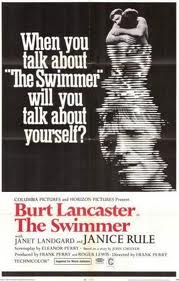
THE SWIMMER
US, 1968, 95 minutes, Colour.
Burt Lancaster, Janice Rule, Janet Lindgren, Kim Hunter.
Directed by Frank Perry.
The Swimmer is taken from a short story by successful American novelist, John Cheever. Many consider it impossible to translate Cheever to the screen and say that Frank and Eleanor Perry have not overcome the impossible. However, The Swimmer is an unusual and interesting ftlm. It is an allegory of Purgatory, only here Ned Merril is still on earth and undergoes his purging amongst his acquaintances in his own neighbourhood. One fine Sunday morning he appears full of life at a friend's pool and decides to swim (wash?) all the way home. As he moves from pool to pool and encounter to encounter, he begins to bend and we begin to realise that he is a fake who is being jolted out of complacency into a recognition of what he has done and how he has affected people's lives. Thus, by the end of the film he is alone with his memories and his disillusionment, knocking in the rain on the door of his locked, abandoned home.
Burt Lancaster fits his role with ease and competence, showing that he is an actor with a wide range - Elmer Gantry, Blrdman of Alcatraz, Judgment at Nuremburg, The Professionals.
Direction is by Frank Perry, screenplay by his wife, Eleanor; they have made David and Lisa, Ladybug, Ladybug, Last Summer and Diary of a Mad Housewife.
1. How much of this film was intended as story and how much as a kind of parable?
2. What was the symbolic value of making the central character a swimmer (the physical exertion and struggling with and moving with the element of water) ?
3. The Swimmer has been considered as a parable of a kind of purgatory -a man re-living his past, going through it again in suffering to a new purging and understanding. How well do you agree with this interpretation of the film?
4. What was your first impression of Ned Merrill - his physical condition, his joviality, his goals and ambitions and his proposal to swim home? Why did swimming appeal to him?
5. What comment on the Connecticut style of life and attitudes began to emerge as he began to swim home?
6. When did Ned Merrill begin to appear more mysterious to you? Why?
7. How did his encounter with each of the following help you to piece together his life better and help you to understand him better: - the woman who hated him and his lack of interest in her son who is dead;
- the socialite friends;
- the African American chauffeur who answered the door;
- the nudists and their fad; thinking he was after a touch;
- Julie Ann Hooper - a friend; her girlish story of the shirt and romance; their running together and leaping hurdles} Ned outrunning the horse; her fright at his flirting;
- (his limp)
- his mistress - their past relationship: memories; she was hurt, he was callous. She is cold;
- the crowded party, his rowdy behaviour, the question, the trolley, his being thrown out;
- the boy, the empty pool; making what you believe to be the truths (his running back when the boy was on the board);
- the crowd at the pool - humiliating him and making him wash, forcing him to struggle through crowded humanity. Fifty cents borrowed, taunted about his debts; the crowd taunting that his daughters were arrogant and thought their father a fool.
8. What was the meaning of the ending as Ned, in the stom, imagines the girls playing on the tennis court and, locked out, batters on his door?
9. Did you find the film a thoughtful, persuasive and imaginative parable?
Published in Movie Reviews
Published in
Movie Reviews
Tagged under
Saturday, 18 September 2021 19:42
Subject Was Roses, The
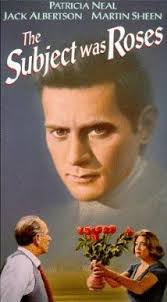
THE SUBJECT WAS ROSES
US, 1968,108 minutes, Colour.
Patricia Neal, Jack Albertson, Martin Sheen.
Directed by Ulu Grossbard.
The Subject Was Roses is one of those mirror films that show us as we are in our day-to-day situations with all our pettiness and our lack of love and forgiveness. This is the film version of Frank D. Gilroy's Pulitzer-prize winning play and some critics have complained of a certain staginess. However there is no mistaking the impact of the unhappiness possible within an ordinary, happy-looking family.
The Clearys are a New York family, father ostentatiously Irish- Catholic, the mother used to more genteel life, the son a nervous boy who has returned from World War II, where he was healthier than he ever was at home. The tangle of the relationships of love and hate is presented so realistically at times that we wince, so close does the film cut to the bone.
Patricia Neal, in her first film after her serious illness, was nominated for an Oscar for her work as Nettie. Jack Albertson was Best Supporting Actor for the year and Martin Sheen completes the fine trio. Very few people have seen the film, which is a pity, as we all need films like this to show us something of ourselves.
1. What is the theme of the film? What does it say about happiness, relationships, communication, suffering? What does it say about the expectations people have of life?
2. Were the Clearys a happy family? Give examples from the dialogue and the situations of tensions and hurt, What was needed to make othe Clearys a happy family?
3. Choose and discuss some of the evocative scenes where the mood and visual images enhance the dialogue and contribute to the theme: e.g. the opening scene, Tim and Nettie dancing, Tim's and his father's visit to the lake-house, the visit to the nightclubs. Nettie's day out, on the sea shore?
4. Did the songs 'Where does all the time go?’ and 'Albatross' contribute to meaning and mood?
5. Mother: try to evaluate her character, also her blame for the situation - e.g. loving but possessive, her ‘ganging-up’ with Tim, her attitude to her mother, and crippled cousin, Willis, her reaction to the roses, her relationship with her husband, her memories and ambitions, her love of good things?
6. Father: good, self-opinionated, loving an audience, money, moods, attitude to Tim, his memories and ambitions, his pretence at being a fine Irishman and good Catholic, his anxiety at Nettie's disappearance, his refusal to believe his wife's story, the incident of the roses, the saying of ‘I love you' by Tim?
7. Was Tim's leaving home the best ending? Did his parents agree?
8. Ti,, a change from 18 to 21, how he blamed his father, then his mother, his sickness of a boy, the change in the army, 18 to 21; Mass, the roses, hia admiration for his father's singing, his trying to assert some freedom, his listening to his parents' memories, his need to hear his father say 'I love you’?
9. Who should have forgiven whom? Who was to blame for all that happened?
10. The film was not popular at the box-office. Why?
Published in Movie Reviews
Published in
Movie Reviews
Tagged under
Saturday, 18 September 2021 19:42
Stranger, The/ L'etranger
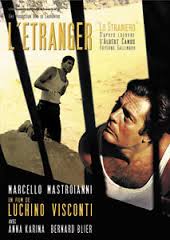
THE STRANGER (L'ETRANGER)
France/Italy, 1967, 102 minutes, Colour.
Marcello Mastroianni, Anna Karina, Bernard Blier.
Directed by Lucchino Visconti.
The Stranger has many interesting features as a film. It is the screen version of one of Nobel Prizewinning philosopher-novelist, Albert Camus' most famous works. It was written and directed by noted Italian director Lucchino Visconti.
Visconti has made some notable films in the 60s, including Rocco and His Brothers (1961), The Leopard (1963), Sandra (1965), The Damned (1969) and Death in Venice (1971). Two of these are based on notable novels by Lampedusa and Thomas Mann. They have been praised for their excellent re-creation of place, time and atmosphere, their qualities of capturing the spirit of paintings on the screen. Here Visconti re-creates Algeria in the late 30s with the same success and gets an excellent performance from Italian romantic hero, Marcello Mastroianni,
Camus was a committed man. A French existentialist with an Algerian background, he knew the hard influences of dally life as well as the hostility in World War II, where he fought in the Resistance. (This is the basis of Camus’ equally famous novel ‘The Plague’.)
In ‘The Outsider’ (a better English translation of ‘L'Etranger’), Camus looks at the ordinary man, his truth and honesty, the victimising by circumstances, yet the strength that comes from relying on one's own integrity and not on superstition and fear. This calm resignation enables one, even in death, to be in harmony with the benign indifference of the universe. Camus' work is obviously a secular parable of man, and, in its relentless honesty, is a most impressive parable. For this reason the film is worth seeing. Visconti gives an excellent though sometimes static and faithful representation of Camus work and ideas.
1. What was the significance of the title? Why is ‘The Outsider’ more appropriate than ‘The Stranger’?
2. What kind of man was Merseault? Was he meant to be an ordinary type or was he meant, to be a special kind of man?
3. How did the episode of Madame Merseault 'e death and her son 'a reactions set the tone and atmosphere of the film?
4. What did you learn about Merseault from his reactions to his mother's death, his conversation with the concierge, the funeral and his reflections on it?
5. Was he too casual in going swimming, going to a film and beginning an affair the day after his mother died?
6. Why did Merseault feel that he had to endure a Sunday? How did Visconti re-create the Algerian atmosphere by showing us what Merseault looked at all that Sunday?
7. What was the significance of the old man and the old dog with their scabs and fighting?
8. What kind of man was Raymond? Why did Merseault help him? Why was Raymond, so brutal to the Arab girl?
9. Why was there a sense of menace on the day of the trip to the beach with the stalking Arabs? How did it oontraat with the enjoyment of their swim by Merseault and Marie?
10. Did Merseault love Marie despite what he said to her?
11. Comment on the role of heat and the aim in the film. Comment on the contrast of sweat and the sea water.
12. Why did Merseault shoot the Arab? How was he affected by the mm? Why did he fire the other three shots? How responsible was he? How responsible did he think he was?
13. What was the significance of the scene where he was put in prison with the others?
14. How was his sense of honesty awkward for those he answered - telling the Arabs that he was in prison for killing an Arab, telling the truth to his lawyer? The confrontation with the official who thrust the crucifix and forgiveness at him?
15. Was the trial too farcical, the lawyers playing to the gallery, everyone fanning themselves, the appearance of his being on trial for not weeping for his mother rather than for the killing of the Arab?
16. How did Mereeault appear at the trial - did he gain in stature as the trial was conducted around him? How did he contrast with those around him? How was he here the "outsider"?
17. How did the evidence of Marie, Raymond, Celeste and the man with the scabs throw light on Merseault? What of the evidence of the people from the home for the aged?
18. How did the speech of the Prosecutor compare with the truth? How was human justice being criticised?
19. How did prison affect Merseault (and the audience - the darkness, the gloom and cold cell, the continual screams or groans)? (The previous scene where Marie visited him and all the visitors had to shout.)
20. What was the function of the interview with the priest? How did Merseault affirm his faith in himself in this sequence? What did he mean that he was glad to fit in with the 'benign indifference of the universe'?
21. How was he calmed of his fear of death by this outburst and his refusal to reply on the props of superstition, self'-abasement or God? What was the significance of death for Merseault?
22. Was this final part of the film good cinema or was it too static? What was the effect of the final frame of Merseault's face?
Published in Movie Reviews
Published in
Movie Reviews
Tagged under
Saturday, 18 September 2021 19:42
Stalking Moon, The
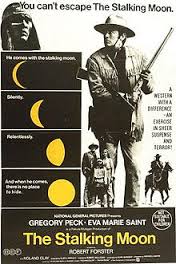
THE STALKING MOON
US, 1968, 108 minutes, Colour.
Gregory Peck, Eva Marie Saint, Robert Forster.
Directed by Robert Mulligan.
The Stalking Moon is a good Western. Its story is not particularly new: veteran soldier protects woman and child against the Indians. But there are some complications as the woman has been prisoner of the Indians and her son has been fathered by the Indian who is now stalking them. Where the film succeeds is in its sense of humanity pervading the film. The plot is not sensationalised. We are interested by the people in the film and their problems and anxieties. There is tension in the final confrontation of soldier and Indian, but it is tense because we have got to know the people involved as well as sharing the dangers of the chase.
The success of the film would be due to Robert Mulligan's more sensitive direction. He has made a number of films with strong social interest, but he invests them with a certain warmth of feeling - To Kill a Mockingbird, Love With the Proper Stranger, Up the Down Staircase. A Western worth discussing and suitable for younger groups as well.
1. Was this just another Western, or was it a Weatern with a difference?
2. How strong was the sense of humanity running through the film - what examples would you give?
3. What did the film ahow of life on a frontier, the hazards, the fight for survival? How does a frontier affect people's attitudes and behaviour?
4. What does the film have to aay about the Indians, the white man's treatment of the Indians and their revenge? What did you think of the rounded-up Indians, walking in groupe with army guards? In contrast, how did Sarah's story affect you - the terrorism, massacre and rape?
5. How did the white men react to Sarah? What did this show of racist attitudes?
6. Whose responsibility were the early massacres - the boy’s, the Whites', the boy's father's? - note the language barriers for the boy, his affection for and obedience to his mother, trying to run to his father, his tears, flick's cards, seeing Sam shot?
7. Did Sarah do the right thing in staying with the Indians and staying alive? She said she couldn't die,
8. How was Sam's sense of responsibility aroused - a kind man of action and dreams? What affect did the scene of the two sitting at the station have on Sam? Why?
9. How did the director evoke sympathy for Sarah - note the concentration on Eva Marie Saint 'e face, her work, her speech, her love for her son.
10. Comment on the mountains, the dust, the cards, people's hands as symbolic of the story?
11. Was the culmination of the film effective? How did the director help the audience to identify with Sam, his fear and his sense of the stalking Indian?
12. The film, although it has a stark and tragic story, has a sense of optimism, goodness, men helping one another and resilient after they are put dawn. How true was this?
Published in Movie Reviews
Published in
Movie Reviews
Tagged under
Saturday, 18 September 2021 19:42
Spy Who Came in From the Cold, The
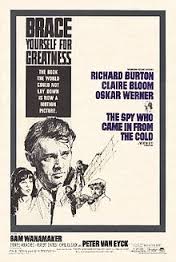
THE SPY WHO CAME IN FROM THE COLD
UK, 1966, 112 minutes, Black and white.
Richard Burton, Claire Bloom, Osker Werner, Cyril Cusack, Peter Van Eyk, Michael Hordern, Robert Hardy. Directed by Martin Ritt.
The Spy Who Came in From the Cold is an adaptation of John le Carre’s famous novel. Filmed in sombre black and white, it provided a stark contrast to the spectacular, colourful spy dramas, adventures and antics so popular in the 60s and summed up in the James Bond films. This story is one of dismal realism and tired disillusionment with the manipulation and duplicity necessary for espionage.
The plot, like all spy dramas, is complicated. We are like all the outsiders to such situations, wondering how much the details we watch are relevant to the plot, wondering who is on the hero's side, who is not, wondering who the victim of all the plotting really is. The cold war is a lonely business for a spy.
Martin Ritt (Hud, Hombre. The Molly Maguires) is noted for his attention to social setting and atmosphere as well as to plot and characterisation. Here we move in a dark and half-alive London of flats, small libraries and rendezvous restaurants; we see East Berlin, prison cells and the wall, the only relief being a walk in the German country-side. As with most of Rltt's other films, death, haphazard and arbitrary death, is meant to make an audience question.
Richard Burton fits the part of Leamas perfectly. The film contrasts with the spy epics and spoofs; towards the end of the 60's a number of films on this theme and manipulation of spies were made, showing almost a cynical attitude towards the 'Control'. Examples are The Executioner, The Kremlin Letter, The Naked Runner, The Ipcress File and the version of the Le Carre's The Looklng-Glass? War.
1. What is the mood conveyed in the dark, black-and-white atmosphere of the film: the dingy London streets, the library, Berlin, prison, court-room, the Berlin Wall at night?
2. What is the point of this spy film? Is there any espionage excitement in it?
3. What is the difference between the cold war and hot war? How does the war situation affect morality (especially, truth and killing) and the manipulation of other people's lives by authorities?
4. Where was 'the cold' and how was the title fulfilled?
5. Why was Leahmas a spy? Was it just a profesaion? Was it just left unexplained or did he have an ideology and loyalties? How much loyalty, patriotism, did he have at the beginning of the film? At the end?
6. What choice had Leamas made before the film had opened? What choice did he make during the film? Acting? Deceiving? Death?
7. How did hie attitudes to Hand and Fiedler vary? (Mund: “He is evil: I hate him and evil is now on my side.")
8. Discuss the presentation of 'Control,' - cold, calculating, the master-planner, use of intelligence, planning and a 'Godlike ' command and use of men.
9. Why was Nan needed? Was she made a sympathetic character to the audience? What was the purpose of her death?
10. Was Fiedler a worthy opponent for Leamas? Why was Fiedler just as much a victim as Leamas?
11. Discuss the morality of spying, the acting, the lies, the manipulation, the giving of information, the deaths. If there any necessity for this, any justification?
12. Is the film completely pessimistic? Who wins? Only 'Control' and Mund?
13. How is the film social comment on the twentieth century?
Published in Movie Reviews
Published in
Movie Reviews
Tagged under
Saturday, 18 September 2021 19:42
Sunset Boulevarde
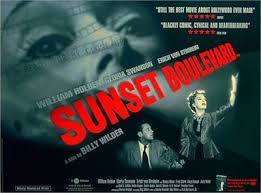
SUNSET BOULEVARDE
US, 1950, 111 minutes, Black and white.
William Holden, Gloria Swanson, Erich Von Stroheim, Nancy Olsen, Fred Clark, Jack Webb, Cecil B. DeMille?, Hedda Hopper, H. B. Warner, Buster Keaton.
Directed by Billy Wilder.
Sunset Boulevarde is an extraordinary film on many counts. William Hoiden gives a good performance as a Hollywood hack who becomes an ageing silent star's kept man. Gloria Swanson as the neurotic actress turns on a performance that must be close to self-parody, but that is melodramatically marvellous. Silent film-director genius, Erich Von Strohelm, portrays an ex-silent screen director who acts as the actress' butler, chauffeur and protector. Cecil B. DeMille? and others portray themselves.
For 1950, the treatment of Hollywood was harsh. So many of the myths am the way of life are exposed in a harsh light. The legends of the 20's live on in the baroque mansion on Sunset Boulevarde and they clash with seediness of the hacks of the 40's and 50's. However, this world is shown as unreal, neurotic and, finally, insane.
Director Billy Wilder writes his films and directs them. (He has two Oscars, The Lost Weekend, 1945, and The Apartment, 1960). He is a quick wltted man, humorous, cutting, so that his films are skilfully made and a delight to listen to. This film has all his best ingredients. Other successes include The Major and the Minor (1942), Stalag 17 (1953), Witness for the Prosecution (1957) and one of the most hilarious films of all, Some Like 1t Hot (1959).
For a thought-provoking, well-made film, Sunset Boulevarde should be seen and discussed.
1. What are the overtones of Sunset Boulevarde, Hollywood, and its way of life?
2. Was the opening technique effective - the atmosphere of a murder and the narration by the murdered man? Joe said he wanted to give the true version before the papers got hold of it. Is reality usually different from the way it is written up?
3. Was Joe Gillis a typical Hollywood writer in his mediocre talent, lack of success, and trying to live by his wits, avoiding the finance companies and trying to persuade producers?
4. Did you feel sorry for Joe in the treatment that he got from the producer, Betty Schaeffer, the agent, the finance men?
5. What were your first impressions of Norma Desmond and the dead chimpanzee?
6. What had gone wrong with Norma Desmond? Was she a great star? Why had she not stayed in films? Was it because of the change from silent to sound film that the pictures became smaller and Hollywood talent lessened?
7. How did Norma Desmond embody the legends of the Hollywood stars - what role did the house play, her car, her wealth, her fans, her photo, films, vanity, Max, her manner and bearing, her imperious way, the dree of a 'return' (not a comeback), her refusal to age, the 'Salome' project, her attempted suicides? How was her owning of Joe part of the same process?
8. Why did Joe allow himself to be owned against his will? He thought he had manoeuvred her into giving him a job. She really manouvred him. Why did he find it humiliating - her giving him money, buying him clothes?
9. Did Norma love Joe or merely depend on him? Did she love Max? What role did he play in her life? Were you surprised that he sent all her fan-mail? Were you surprised to learn ne was her first husband?
10. What was the effect of watching her watch her own films and show her profile in the projector's light? What was the effect of the New Year's party? The quarrel, Joe's escape and enjoyment of the party and people his own age, the suicide attempt, the return and 'Happy New year' and 'Auld Long Syne" against this scene?
11. How was Hollywood presented? Was it presented ironically (especially as the film was made by Paramount)? Comment on the 'wax works', the writers, Betty Schaeffer, Norma's impersonation of the Mack Sennet Beauty and of Charlie Chaplin, Paramount's wanting her car, her visit to DeMille? and her admirers (and her fear of the microphone), her being put off?
12. Why did Joe relish the creative work of the script? Why did he fall in love with Betty?
13. Why did Norma ring Betty and act so viciously? Why did this break Joe? Why did Joe force Betty away from her?
14. Was the shooting scene handled well? Why did Norma shoot Joe?
15. How cynical were Joe 's comments after his death, on the police and the reporters?
16. How was Norma's retreat into madness shown? How effective was her insane acting out of Salome and her descent of the staircase? She had acted like a silent star in her ordinary life - how did this come to a head finally? (What role did Max play here?)
17. What comment on the whole Hollywood way of life, its myths, its extravagance and its cruelty did the film -make?
Published in Movie Reviews
Published in
Movie Reviews
Tagged under